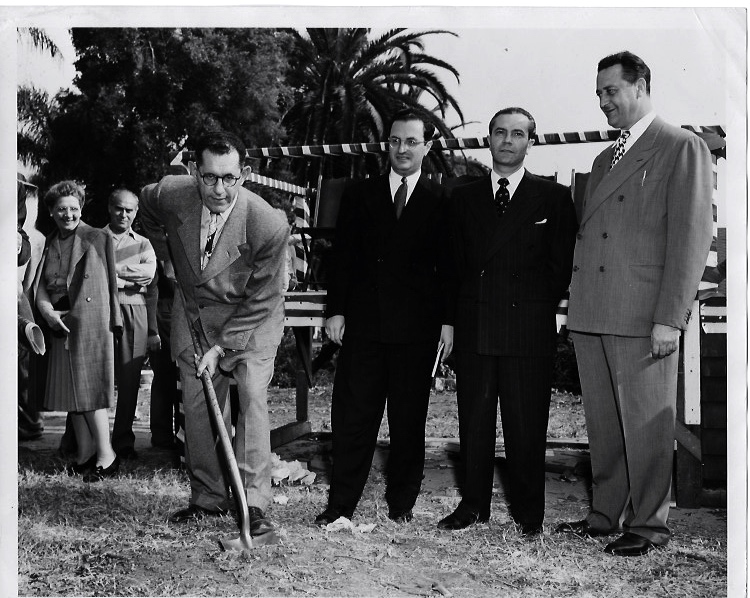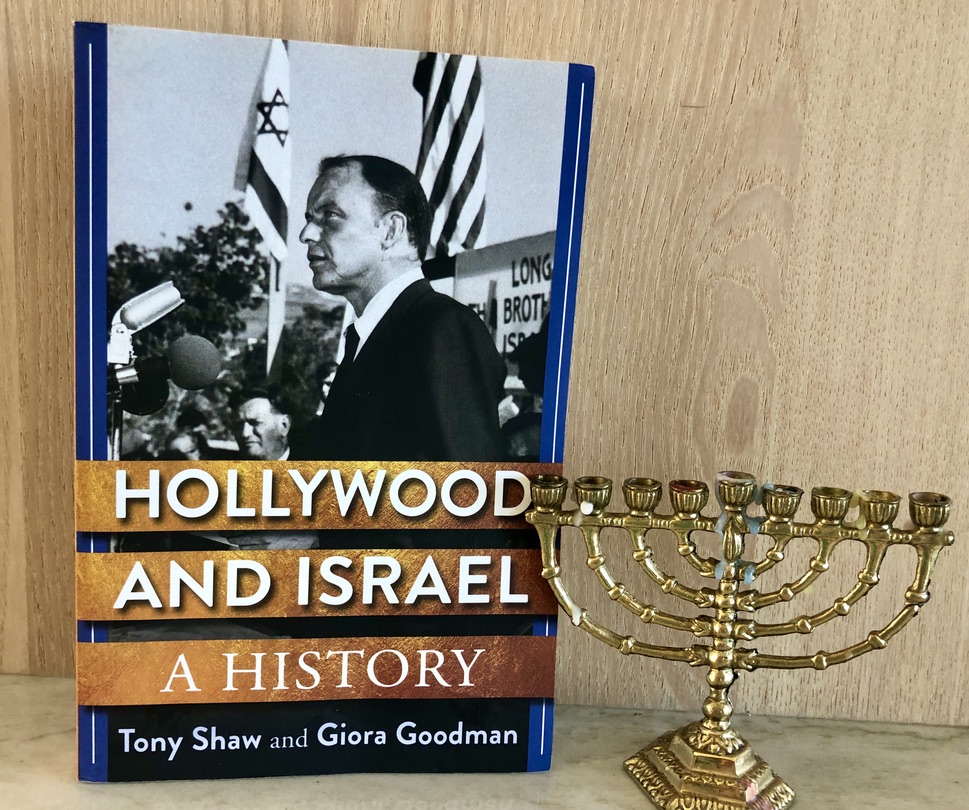Tony Shaw, coauthor of “Hollywood and Israel”, is neither a friend or a stranger. He’s a professor of Contemporary History at the University of Hertfordshire in the United Kingdom who reached out to me in 2015. He explained he was writing a book about Hollywood’s historic relationship with Israel and hoped I could help. At the time, he was in Los Angeles combing through Temple Israel of Hollywood’s (TIOH) archives. He sought information on how former TIOH rabbi to the stars Max Nussbaum, an ardent Zionist, played a central role as a Hollywood-Israel matchmaker from the 1940s to the 1970s.
I told him what I knew: that my great-grandfather Sol cofounded Temple Israel of Hollywood; served three years as its first President and befriended Rabbi Nussbaum, who delivered a stirring eulogy for Sol as “a giant in the motion picture industry” in 1958. Sol financially supported European Jewish immigration to Palestine as part of his efforts to save Jewish lives from the Nazi regime, embraced Zionism and longed to visit Israel with his son (my Uncle Paul). Sadly, Sol suffered a debilitating stroke and never made it to the Promised Land he’d championed.

I next heard from Tony in March 2022 upon publication of his book. Whoa – he and Giora Goodman must’ve done a hell of a lot of researchif it took seven years to get published I remember thinking at the time.
Tony wanted to send me a copy and hoped I would read and review it. I made no promises but said I’d love to see it. The book arrived straight from Columbia University Press and sat on my shelf untouched. Two months later, I received another email from Tony, “Can I ask what you thought of the book?” I felt too guilty to respond and say it was gathering dust – especially after he’d spent so much effort on it. So I rudely ghosted him (apologies to Tony) – until now! Better to read the book six months late than never . . .
The incredible depth of the book’s research blew my mind. Tony and Giora found personal correspondence between future Israeli Prime Minister Menachem Begin and Hollywood screenwriter Ben Hecht for gosh sakes! They included everything from 1925 articles in the “Palestine Post” about the filming of the silent movie “Jacob’s Well” starring Betty Blythe to Roger Ebert’s 2019 review of Netflix’s “The Spy” starring Sacha Baron Cohen. That’s almost 100 years’ worth of material.
In the introduction, Tony and Giora describe their book as being about “where politics, war, diplomacy, and celebrity intersect . . . the interconnections between identity, ethnicity and capitalism.” They state, “It is a book designed for lovers of politics and film and for those people who want to know about the realities of star power.” Understandably, the coauthors hope for more than just an academic readership. Alas, their deep archival dive can be both a blessing and a curse. “Hollywood and Israel” covers a lot of filmic ground in granular detail. I’m not sure the book will find the wide audience they hoped for as it reads more like a broad survey than an incisive, revelatory commentary.
The book succeeds at capturing Hollywood’s excitement about the emergence of a new liberal democracy and post-Holocaust homeland for the Jewish people. Jewish filmmakers in particular wanted to share their passion for Israel. In turn, Israel wanted to attract Hollywood production money and project a positive image around the globe. This mutual interest reached its height with Otto Preminger’s adaptation of Leon Uris’s bestselling novel “Exodus” starring heartthrob Paul Newman as a heroic freedom fighter waging war to establish a Jewish homeland. The 1960 film proved to be a huge hit.
As the book exhaustively describes, no other Jewish/Israel-themed film really matched “Exodus”‘s international box office success until Steven Spielberg’s 1993 film “Schindler’s List” about a German businessman who saved his Jewish employees from the Nazi death camps. The film ends in Israel making a strong emotional case for the Jewish homeland.
“Hollywood and Israel” explains that as the Israeli army became an occupying force in Gaza and the West Bank a bit of the bloom fell off the rose. Perceived internationally as more an aggressive Goliath than underdog David, Israel didn’t smell quite as sweet in Hollywood. Steven Spielberg’s controversial 2006 movie “Munich” which addressed the amorality of Israel’s approach to counterterrorism provides a case in point. The film suggested clandestine “eye for an eye” executions of terrorists made the whole world blind to the human cost of the Israeli-Palestinian conflict.
The book explains that Spielberg made the film as a “prayer for peace.” Tellingly, “Munich” did not do as well at the box office as Spielberg’s other films. This fact brought to mind a quote attributed to pioneer producer Sam Goldwyn, “Pictures were made to entertain; if you want to send a message, call Western Union.” The founding moguls knew that to keep their studios running they needed money-makers – not polemics.
The tension between personal sentiment, artistic passion and commerce is as old as Hollywood itself. That’s why “Hollywood and Israel” struck me as somewhat naive. Of course, Israel’s heroic underdog origin story moved sensitive Hollywood souls of all religious persuasions to support the nascent nation. Plus, Jewish producers and creatives naturally had an affinity for the reclaimed homeland that absorbed their traumatized European brethren post Holocaust. But ultimately, Hollywood specializes in storytelling not politics or personal passion projects. The best told tales win at the box office – special affinities, propaganda and polemics be damned.

